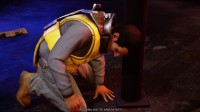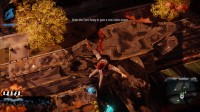Infamous: Second Son
Playtime: 12.2 Hours
Finished 13 August 2023.Played on Normal difficulty, played the good route. Managed to 100% everything in Seattle in just a couple of days - the city in this game is much smaller than in most others. Since I generally prioritized completing the city & battling DUP influence over doing any of the actual story, I got to play around a lot with the smoke and neon powers, but didn't do much with Video or Concrete.
This was a pretty short game that was surprisingly easy to 100%, played over a couple of days in the interim after finishing XC1 and before returning to XC3:FR just as a change of pace for me. This is another PS+ game I wanted to try before my subscription ran out (in Nov 2023), so I'm personally glad that it was so short, but I'd imagine anyone who actually bought it when it came out would probably be disappointed how little there actually is to do in Seattle - like many other "open city" games, the map is broken up into sectors, each with a series of different activities to do in order to take control back from the DUP. That being said, it's really odd how little justification or background there really is to explain what's going on in the game - or why the DUP decided to suddenly become some evil regime guarding just one city, as if these Conduits can't appear anywhere else. Apparently, all the concrete structures, heavy patrols and military equipment were built up over just a matter of a few days - meanwhile, the DUP troops suddenly started enforcing checkpoints and randomly jailing people, but apparently there are reports of this going back 7 years? The writing and entire premise of this game is so shaky and inconsistent that it's hard to really care about anything that happens in the game.
To go even further, while I don't hate the character of Delsin Rowe, he's an incredibly generic early-20s (?) wannabe punk spraying graffiti and acting like the college bro who keeps moonlighting about his high school days. The other "protagonist" characters include a generic cop brother (Reggie), a generic punk-ish young teen girl (Fetch), and a generic nerdy game young teen guy (Eugene, forgot his name while typing this haha) that seems to be addicted to in-universe Diablo. Not really a superstar cast. By the way, in one of the missions after recruiting Fetch, they start flirting a bit - which seems incredibly creepy given what seems to be a several-years age difference. I could be misinterpreting it, but that wasn't really a good look IMO - this is never brought up again though. On the other side of the story, the villain's (Augustine's) motives are also really inconsistent - wanting to imprison all Conduits in order to save them? Haphazardly freeing them in the good ending doesn't seem like a very good solution either, so I have no clue what this game was actually trying to portray here. My mind struggles to imagine how adults came up with a story like this.
With all said about the story & characters, the gameplay is actually reasonably fun but not particularly memorable. To put it simply, it's like PS4 Spider-Man if it came out a couple years earlier and was strictly worse. The brevity of the story is nice for me, since it was a great bite-sized game that I could finish and toss over a weekend, but it really doesn't give enough time to truly play around and discover the depths of the powers. By the time you get into a flow with a couple of them, the city is pretty much already cleared out. Of the 4 powers, I had a good time with Smoke & Neon, but had almost no chance to do anything with Video - and Concrete is only unlocked during the final boss, when I had already completed everything. Also, since you can only have one active at a time, there was a necessity to make them all fit a particular mold, so the differences between them tend to be fairly minor. They all have a melee, a ranged shot, some kind of dash, and a heavy ranged attack, and one miscellaneous power. When it comes to upgrading, the good/bad morality system in this game unlocks different sets of upgrades to encourage multiple playthroughs, but the base powers are still the same which kind of defeats the purpose to me.
When it comes to enemies and mission balance, pretty much all the reviews or comments mentioning that things are repetetive is spot-on in my experience. Each sector of the city has the same list of activities that all play out the same no matter where you are. Unlike games like Saint's Row, with a huge array of different activities to explore like Genki, Heli Assault, etc., ISS just has the same "shoot camera" and "find drones" minigame everywhere. Even the main missions are repetetive. Of all the main missions, the general progression involves discovering a new problem involving a new power (Smoke in the prologue, then Neon, then Video), figuring out the source of that power, then draining that power in a boss fight. Afterwards, there are a couple more missions involving sucking up core shards to get new abilities related to that power, then some more miscellaneous missions with the Conduit who gave the power to you. Repeat a few times, then fight the final boss, which still involves getting the Concrete power and a bunch of sub-abilities that help you beat up Augustine. With the city sectors all being more or less the same, and the similarities between each of the powers, the only difference is a slight power creep on the side of the enemies - they eventually get more armored units, snipers, explosive troopers, more big guys and melee dudes, and helicopters. For the most part, you still end up slapping them with your chain or using the basic shot so that doesn't feel very different either.
This game is kind of confusing to me. Just like Fallen Order, it's a game that I never would have bought on my own, but I'm not disappointed that I played it. This really didn't feel like a meaningful experience to me, though - just some mindless fun. I ended up getting into a bit of a flow with the combat and so enjoyed it as a bit of easy fun, but it's absolutely a game that you can judge in the first 30 minutes; if it doesn't catch you by then, it never will. At the end of the day, I have a hard time figuring out if I wanted the game to be longer, to give me more to explore in this alternate Seattle, or if it should have been shorter, since there is admittely so little depth to the game.






